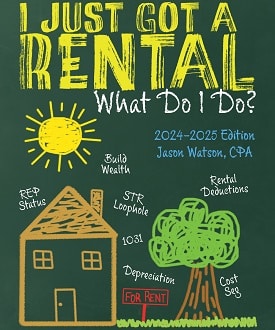Getting The Rental Business Launched
 By Jason Watson, CPA
By Jason Watson, CPA
Posted Sunday, May 25, 2025
There are four types of expenses that you might have outside of the rental property purchase itself-
- Start-Up Costs such as Investigatory, Organizational (LLC formation, legal and professional fees) and Pre-opening Expenses. These are after you’ve decided to purchase a rental property but before identifying the target rental property.
- Lost Expenses (no sneak peek).
- Furnishings and Supplies (business related expenses).
We’ll skip real estate acquisition costs since we have an entire section dedicated to that but dive into the other three (especially rental property start-up costs).
Start-Up Costs (Investigatory, Organizational and Pre-opening Expenses)
You can immediately deduct up to $5,000 of the following expenses (we listed the most popular)-
- Professional fees paid fees paid to lawyers, accountants, consultants, etc. to assist with getting the entity formed, drafting a sample lease, etc. Similar fees in connection with the purchase, however, are acquisition costs and are added to the basis of the rental property.
- Business licenses, permits, and other fees. These are not for the rental property itself, but rather general business licenses and permits.
- General real estate research (think AirDNA subscription) and best business practices, including educational seminars or conferences.
If you have more than $5,000 but less than $50,000 in these expenses, the difference is amortized and deducted over 15 years.
Let’s back up a bit since there is a fine line between start-up costs and acquisition costs. IRC Section 195(c)(1) defines “start-up expenditure,” in part,
as any amount (A) paid or incurred in connection with investigating the creation or acquisition of an active trade or business, and (B) which, if paid or incurred in connection with the operation of an existing active trade or business (in the same field as the trade or business referred to in subparagraph (A)), would be allowable as a deduction for the taxable year in which paid or incurred.
However, once you identify the target business, and in the context of this book, the target rental property, associated expenses are no longer start-up (investigatory) but rather capital in nature (acquisition costs). Here is a nice summary from IRS Revenue Ruling 99-23 (yeah, way back when but still relevant)-
Expenditures incurred in the course of a general search for, or investigation of, an active trade or business in order to determine whether to enter a new business and which new business to enter (other than costs incurred to acquire capital assets that are used in the search or investigation) qualify as investigatory costs that are eligible for amortization as start-up expenditures under § 195. However, expenditures incurred in the attempt to acquire a specific business do not qualify as start-up expenditures because they are acquisition costs under § 263. The nature of the cost must be analyzed based on all the facts and circumstances of the transaction to determine whether it is an investigatory cost incurred to facilitate whether and which decisions, or an acquisition cost incurred to facilitate consummation of an acquisition.
Please do not confuse “pre-opening expenses” with expenses incurred after the rental property was purchased but before it was available to rent. Rather these expenses are after a decision has been made to establish or purchase a rental property as a business but before the business begins. These costs include expenses related to advertising, acquiring tenants or guests (Airbnb or VRBO initial costs), professional services, setting up books and records such as QuickBooks Online setup, etc. Pre-opening activities are engaged in before the day on which the active rental business begins in anticipation of such rental activity becoming an active business.
Possible Lost Expenses
Speaking of expenses between closing and available for rent date (in-service date), what about mortgage interest and property taxes while you are getting the rental ready? In line which with we just learned from IRS Revenue Ruling 99-23 and IRC Section 195, these expenses are not considered start-up costs and can pose a real problem for real estate investors. You could possibly deduct the mortgage interest as a second home, but further discussion is required. You might be able to deduct the property taxes subject to the current $10,000 combined state and local tax limitations on Schedule A of your Form 1040 tax return.
What’s the answer? The answer is to get that rental property ready and available for rent and let the world know as soon as possible. Place it in-service like now.
You purchase a rental property on July 1, and it is generally ready to rent. Nothing says you must immediately pay a bunch of money for fancy pictures, staging and VRBO listings. The rental property is available with nothing more than your willingness and a yard sign. Then you can start shooting the money canon.
Nothing says you must also align your rent fee with market conditions; for example, you buy a ski condo on September 1. No one is going to rent your condo until at least Thanksgiving, but it is available to rent, and as such you are no longer in the start-up phase.
Finally, nothing says you cannot have the rental property available for rent, and simultaneously be painting various bedrooms and walls waiting for your first tenant or guest.
Nothing has a lot to say, right?
This a) ready and available for occupancy and b) being held out for rental use (advertising and related efforts) standard makes sense- the asset is deployed for its intended purpose which is to produce income. Know the rules. Assert your facts accordingly. See our rental property in-service defined for more information.
Sidebar: If you are constructing a rental property, then usually the construction loan interest and interim property taxes will be capitalized and added to the ultimate cost of construction. See our capitalizing construction mortgage interest section for expanded thoughts on this nugget.
Carrying Costs
As you can see you might be in no-man’s land or what some call “pre-rental status” where the rental property has never been rented before and is not yet ready for occupancy. Not all is lost during the time between closing and when the rental property is placed into service (ready and available for occupancy, and held out for rental use through advertising and related efforts). How?
If you elect under IRC Section 266 to capitalize certain carrying expenses which is fancy accounting-speak for lumping expenses such as-
- Utilities (e.g., electricity, gas, water)
- Insurance
- Mortgage interest
- Property taxes
- Maintenance and security expenses
How does this immediately help you? It doesn’t. However, it allows you deduct these expenses in the future through depreciation or if you sell the rental property. See our capitalizing construction interest and carrying costs section on page 305 for a bunch more information.
Sidebar: If you are constructing a rental property, then usually the construction loan interest and interim property taxes will be capitalized and added to the ultimate cost of construction.
Furnishings and Supplies
Ok, who wants some easy stuff? After all that start-up cost nonsense, we all could, right? All the kitchen wares, linens and supplies such as paper towels, coffee pods, soap, etc. are immediately deductible provided they are $2,500 or less per item (see our discussions on rental property safe harbors). Furnishings will likely qualify as well unless you spring for an expensive sectional or fancy dining table. We’d be weary of any hot tub that costs $2,500 or less. Section 179 expensing is another option should some of your furnishings not be eligible for the de minimis safe harbor.
Recap of Getting the Rental Business Launched
A real estate investor could look at three discrete buckets of expenses or expenditures depending on different phases or timelines as you go from no rental to your first tenant or guest-
- You are considering purchasing your first rental property, but haven’t targeted one in particular. You incur some costs for a conference and for your pals at WCG CPAs & Advisors to assist in launching an LLC. These are start-up costs, and they may be immediately deducted as expenses if $5,000 or less, or amortized over 15 years (yuck).
- You target a rental property, and incur travel related expenses to inspect the property and close the deal. These are acquisition costs, and are added to the depreciable cost basis of the acquired property (and depreciated over 27.5 for residential or 39.0 years for commercial / short-term).
- You have several expenses buying kitchen wares, linens, supplies and furnishings. These are business related expenses to get your rental property activity underway. Typically, they will a) fall under the de minimis safe harbor and immediately deducted as expenses if $2,500 or less or b) immediately expensed with Section 179. We talk about both in a later section.
Different phases. Different handling.
Talk to a Real Estate CPA About Your Rental Property
Please use the form below to tell us a little about yourself, and what you have going on with your investments and wealth-building objectives. WCG CPAs & Advisors are real estate CPAs, tax strategists and rental property consultants, and we look forward to talking to you!




